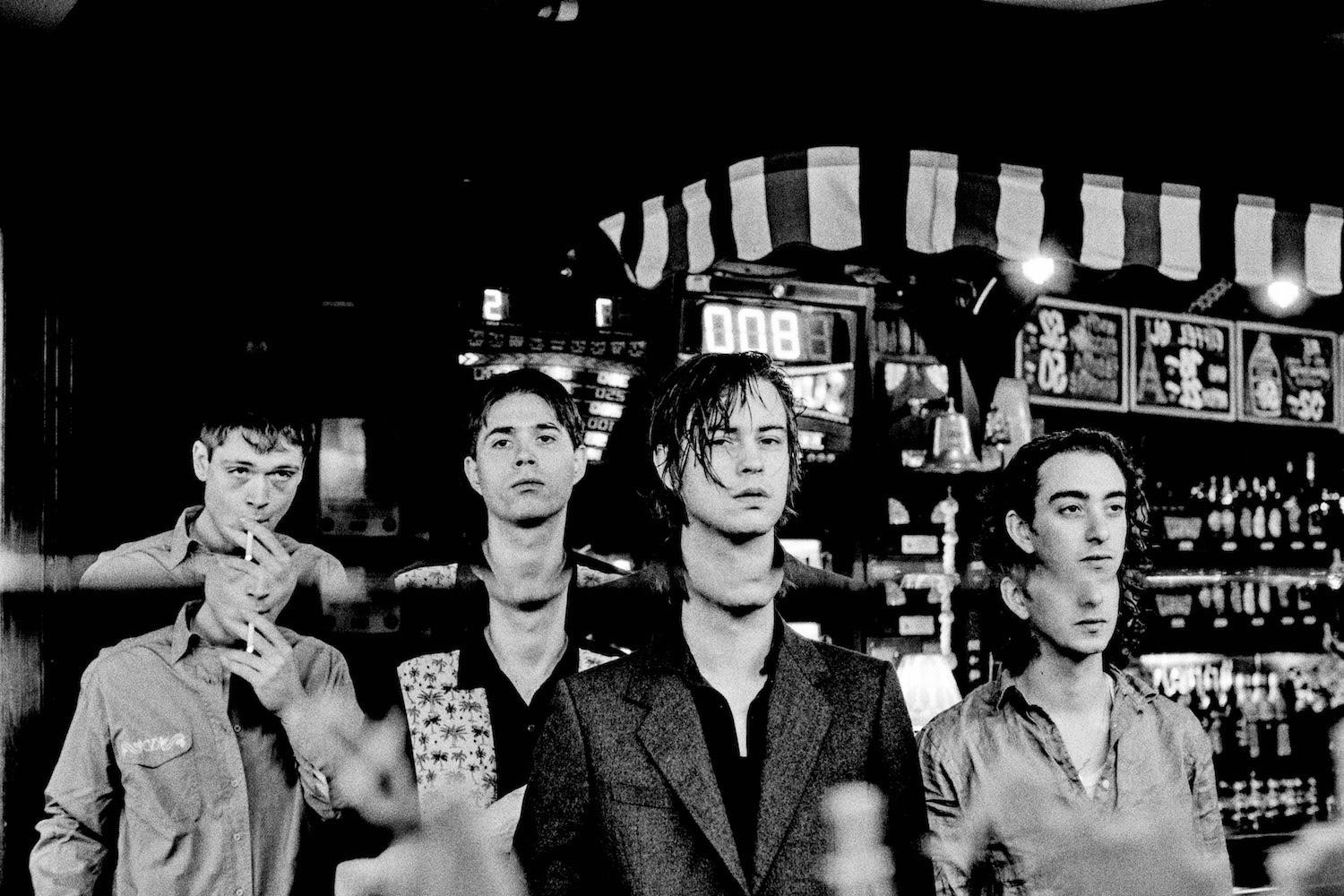“Where does anything come from? It’s a good question.”
Iceage frontman Elias Bender Rønnenfelt has always been someone who asks the kind of questions many would be afraid to. Having been in the spotlight since the Danish band formed in 2008, when their average age was just 17 years old, Elias has always felt like a voice that was born for the wrong era. For his audience though, it’s perfect timing. After all, who else is asking questions like that?
Four years since the last Iceage release, rather fittingly they’re poised to return with their fourth album ‘Beyondless’. Though for many, 2014’s ‘Plowing Into The Field of Love’ heralded the most ambitious, and together, album Iceage had made to date.
So how do they one-up the album that’s near enough come to define them? Well, they’ve created a record based on the idea of a word that actually doesn’t exist. Just to, you know, keep us on our toes.
“I mean… it’s a word that doesn’t exist in a dictionary, but, still suggests a perfect meaning itself,” Elias starts. “I didn’t invent the word myself. I was reading a book by Samuel Beckett called ‘Worstward Ho’, and it plays around a lot with language and breaks up words and conjoins them in ways.”
It’s this that sets Iceage apart; they have the understanding that the world isn’t something you should take at face value, and nor should you kill yourself to try to develop it further when there are paving stones set around you.
In the same form Samuel Beckett conjoined words, Iceage marry musical ideas to create an apocalyptic post-punk world that you actually wouldn’t mind inhabiting. He delves further into the inspiration by this non-word.
“Beyondless struck me, because if you were to say ‘beyond-less’ that would be something that is ‘beyond less’. But conjoin the two words, and it becomes about something that doesn’t have a beyond. So, the meaning of that word for me is something that’s without beyond, something that doesn’t go any further. Or something that doesn’t have something that can be a surface without a backside.”
[sc name=”pull” text=”I believe enough in what we do to deem it a worthwhile pursuit”]
Trying to keep up a mind that can delve deep into literary history, pull out a word and then create its own immersive piece, can be hard work. But the basis for the push and pull of intelligence over human nature stems from a much more natural background.
“We’re…” he starts. “Trying to change something that is as wholesome as a human might be – and that involves a lot of contradictions and grey areas.”
Between his pauses and considered answers, Elias really doesn’t let anyone in on the whys and hows. Rather, the presented truth is one that neatly falls next to the complexities they use as a flourisher.
“Perhaps something a little more complicated than the boxes that people urge to put you in. I think it’s always been loaded with a lot of stuff. Feelings combatting each other and a lot of catharses and an inner storm…
“So yeah, if you say it’s something that’s not necessarily easy to grasp onto then for me that’s a good thing. Not that we invented the fucking wheel either, it’s not exactly innovative.”
As brutal and harsh as their sound can be, Elias is also unafraid of laying his cards on the table. They’ve always been a force to be reckoned with.
“To me, the very traditional constraints of a rock band are something that you can inject a certain amount of soul into,” Elias considers.
On this search for new horizons, the band enlisted the help of Sky Ferreira on recent single ‘Pain Killer’, simply because “she immediately came to mind.”
As much of a buzz as that collaboration caused, they aren’t ones to dwell upon praise or criticism. For them, it’s all noise that can dilute the core aspect – the art.
“You can’t write with the opinions of fucking people in the back of your head, you know? It’s a process that we hold with great importance and that we want… [to] not [be] disturbed by anything.”
The fact that the album was introduced with an essay penned by punk-lifer Richard Hell, who wove allegory and prose around what Iceage, and ‘Beyondless’, must surely add weight to the album for listeners, right?
“I think weight is a bad word there. It’s flattering that there are these people who are willing to reflect and write something about this record,” he says, dismissing this idea.
“Apparently there was something to write about there, and… I believe enough in what we do to deem it a worthwhile pursuit and if some people… whoever they may be, identifies with it, then that’s great.”
To pigeonhole Iceage is almost impossible. They’re portrayers of grandiose lyrics, menacing music and ideas way above any station that can be understood by any bystanders. The ‘why’ of this, though, is something that’s stumped Elias.
“It beats me. But we do try and create something out of a space and a gut feeling that takes its own course and feels… I mean, we don’t act upon an idea that doesn’t feel vivid, or like, it has a sense of direction to it.”
Which brings us back to the initial question. Where does anything come from? For Iceage, it reads almost like their own folklore.
“It’s just something that we started doing. Maybe it was just a way to kill boredom? Maybe it was a way to create something that spoke to itself, because nothing else was?”
It’s not a bad result for something drawn out of combatting boredom.
Elias continues, musing this thought. “I think it’s just taken a course that’s continued to be something that’s tremendously interesting for us to do.
“Exploring what making records and dabbling in songwriting is just something that keeps on feeding some sort of need… I personally think.”
Hitting more introspective depth, he ends. “In songs – in my mind – my brain is wired like that, so I keep on doing it.”
Taken from the May issue of Dork – order a copy or subscribe below. Iceage’s album ‘Beyondless’ is out 4th May.





